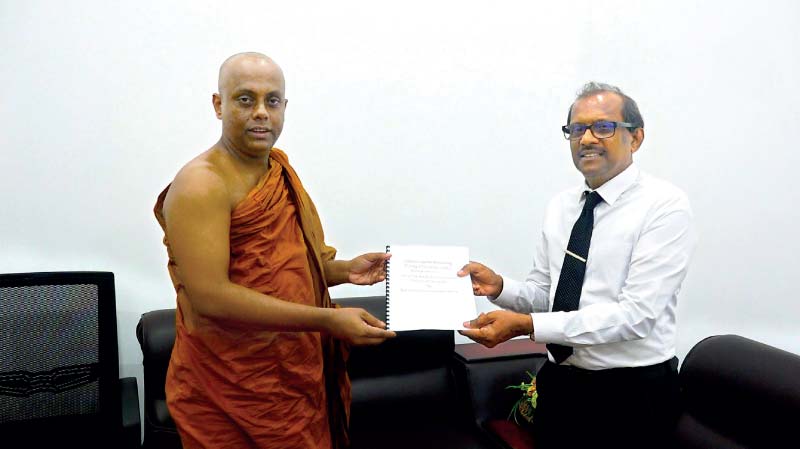Wednesday Feb 25, 2026
Wednesday Feb 25, 2026
Monday, 27 May 2024 00:50 - - {{hitsCtrl.values.hits}}

National Environment Caucus Ven. Pahiyangala Ananda Sagara Thero handing over the report to SLSEA Chairman Ranjith Sepala
Following is an overview of the recent meeting between the National Environment Caucus, led by Ven. Pahiyangala Ananda Sagara Thero, and Sri Lanka Sustainable Energy Authority (SLSEA) Chairman Ranjith Sepala
The National Environment Caucus, led by Ven. Pahiyangala Ananda Sagara Thero, recently handed over a report titled “Addressing the Prevailing Energy Crisis in Sri Lanka: Renewable Energy; Securing the Present and Future of Sri Lanka” to Sri Lanka Sustainable Energy Authority Chairman Ranjith Sepala. Ven. Pahiyangala Ananda Sagara Thero also engaged in a significant discussion with Sepala, on the need for the country to fast track on the sustainability path. The primary focus of the report and the topic of the discussion was the current status and future prospects of renewable energy in Sri Lanka. This meeting underscored the importance of sustainable practices and explored strategies to enhance the country’s renewable energy capacity.
Following this discussion, Ven. Pahiyangala Thero remarked, “Examining the country’s expenditures reveals that a significant portion of our foreign reserves is spent on purchasing coal and petroleum for energy production. Sri Lanka possesses year-round potential for renewable energy, which we must harness by transitioning to solar and wind power. Many unfounded myths are circulating about the planned renewable energy projects in the Mannar region; these are entirely false. This prompted our discussion with the SLSEA, where we presented a report based on our findings.”
Sepala commented upon receiving the report, stating: “The future energy needs of this country must be met through renewable energy sources. This is the only way to reduce energy costs for our citizens. We also discussed the currently planned renewable energy projects and the necessary steps to move forward. The planned projects in the Mannar region were also covered, and Ven. Pahiyangala Thero agreed to assist us in any way he can to get these projects underway.”
The report presented to the SLSEA, which includes scientific findings compiled by the National Environment Caucus, will be critically important for the SLSEA. These findings will provide valuable insights that will aid all stakeholders in developing a sustainable strategy for Sri Lanka’s transition to renewable energy. By leveraging this comprehensive data, the SLSEA can effectively guide policy-making and project implementation, ensuring a successful and efficient shift towards renewable energy sources for the country.